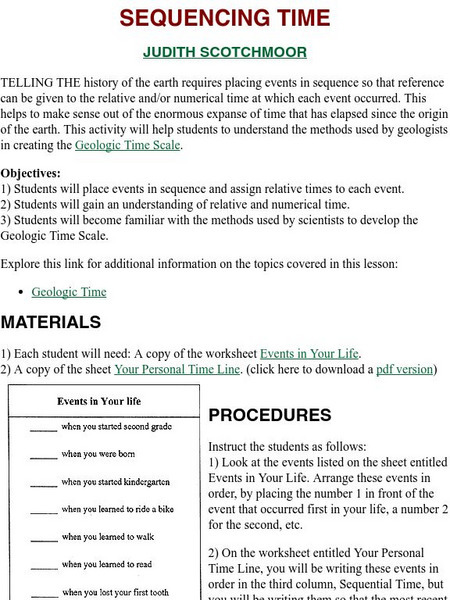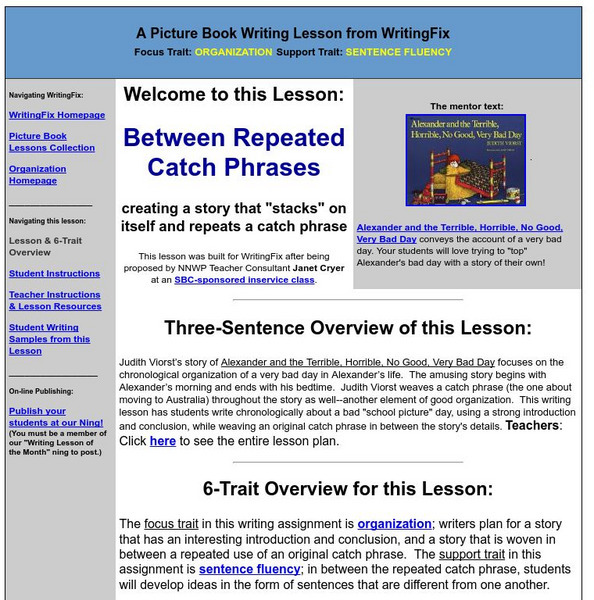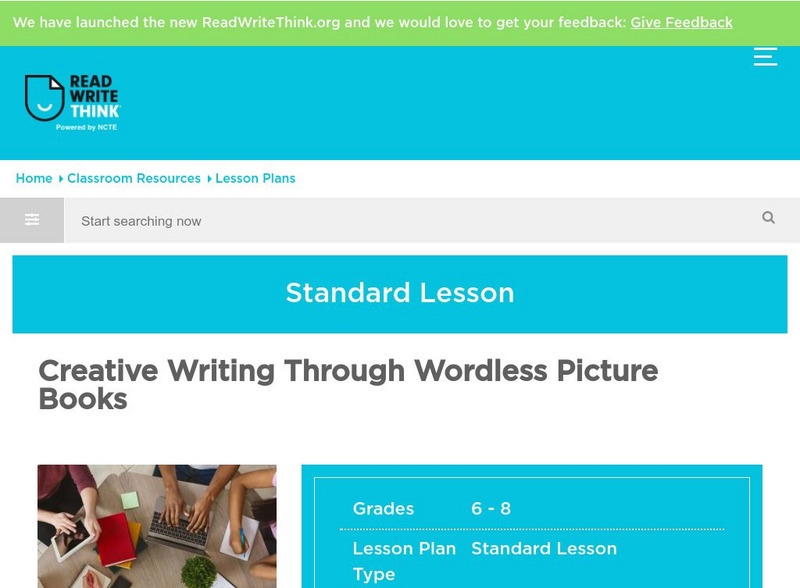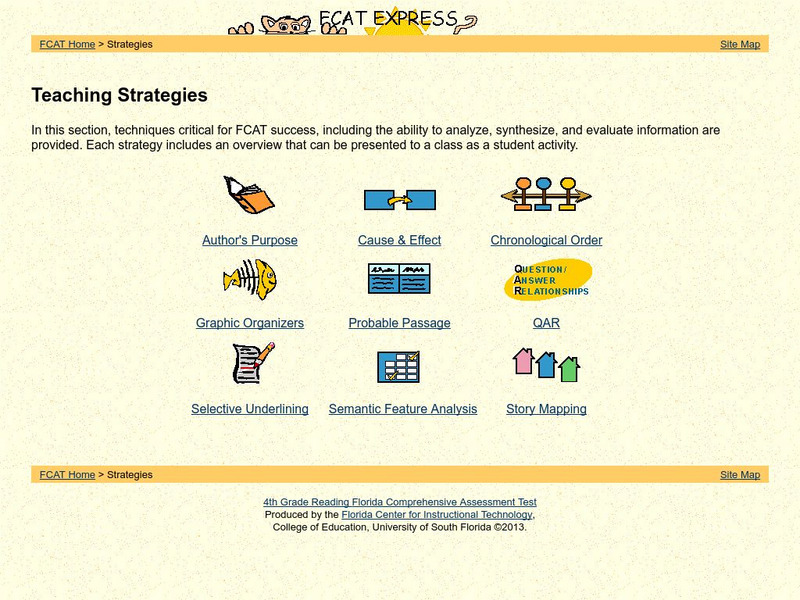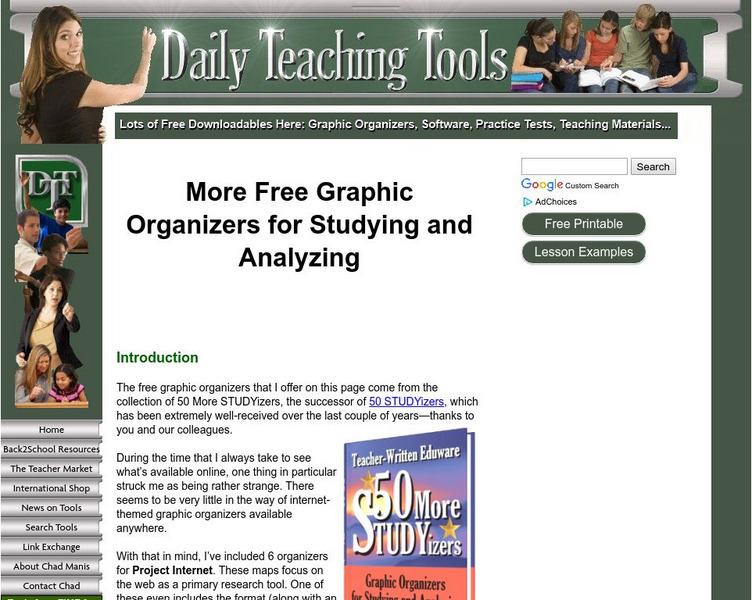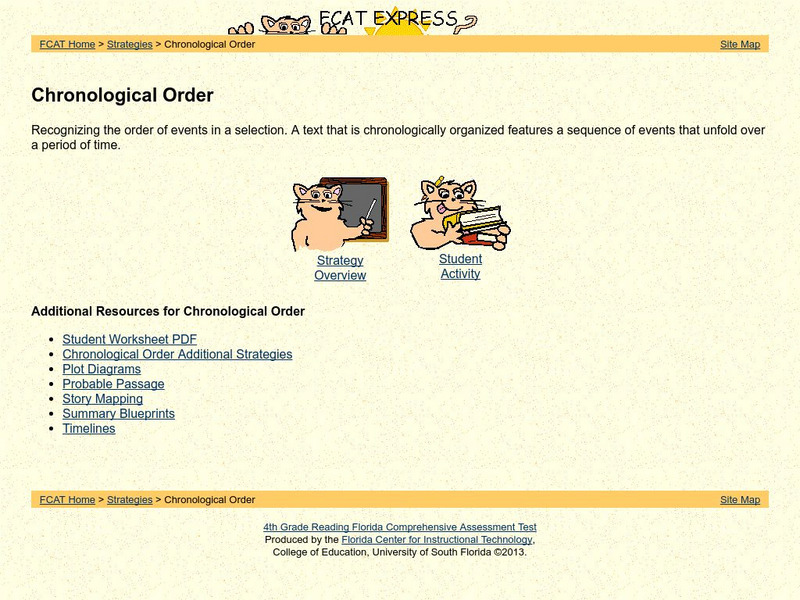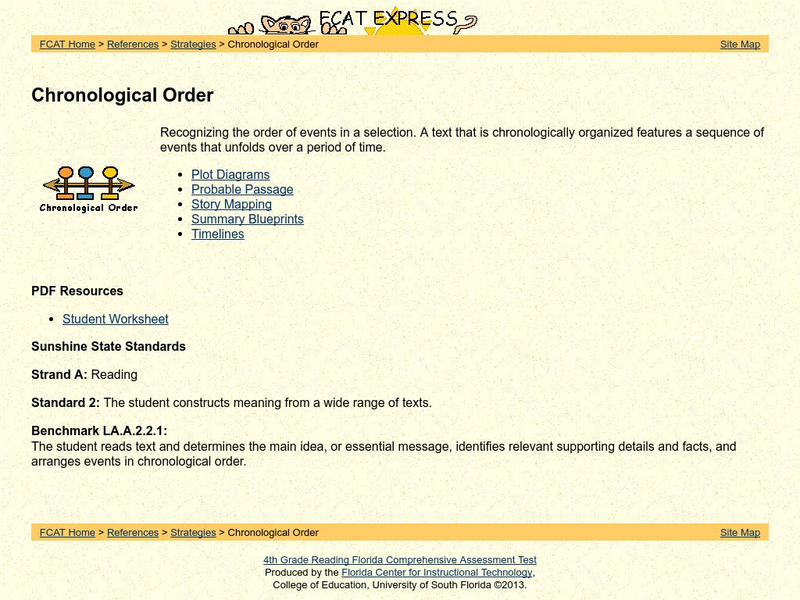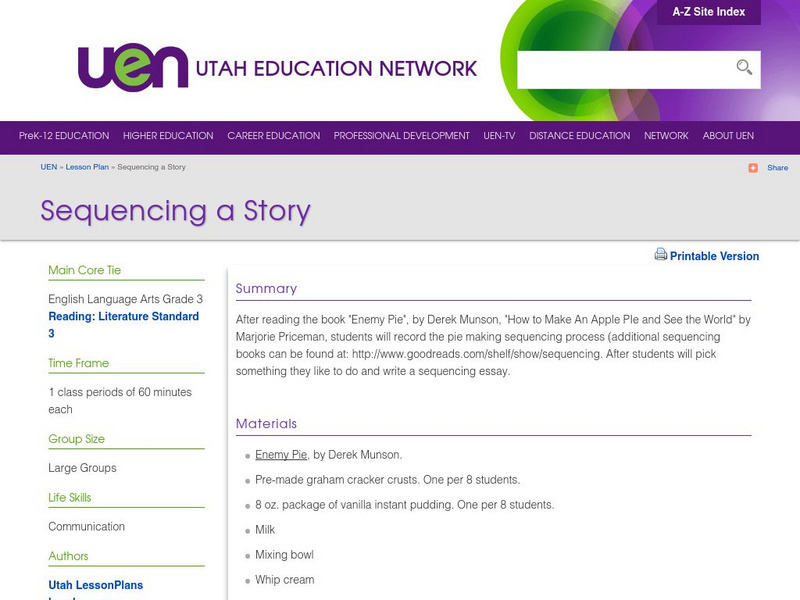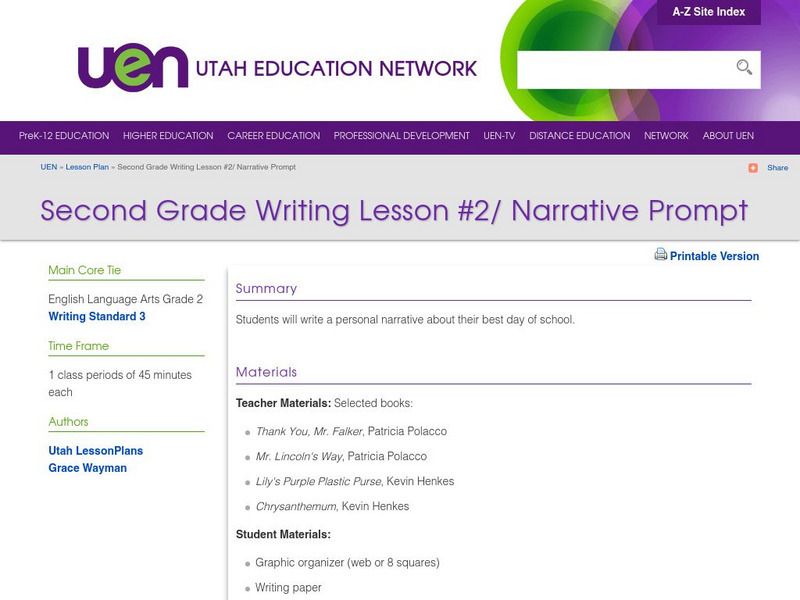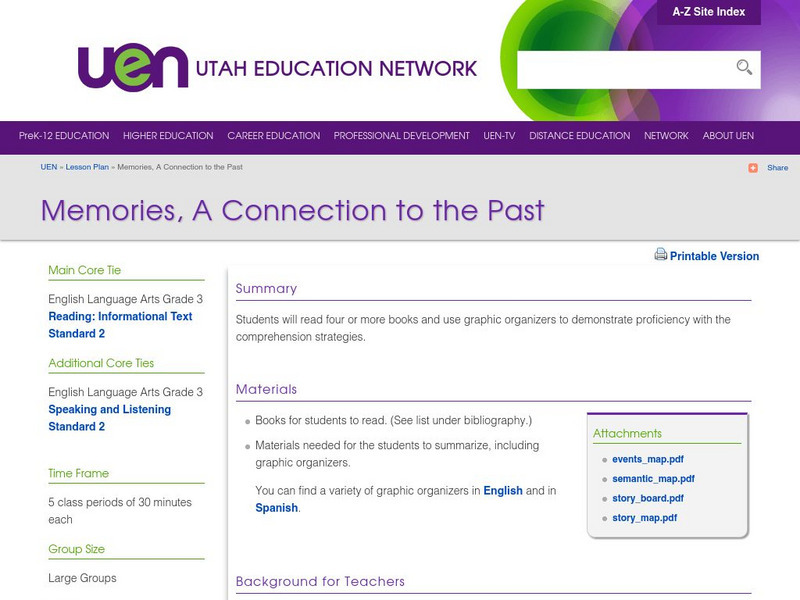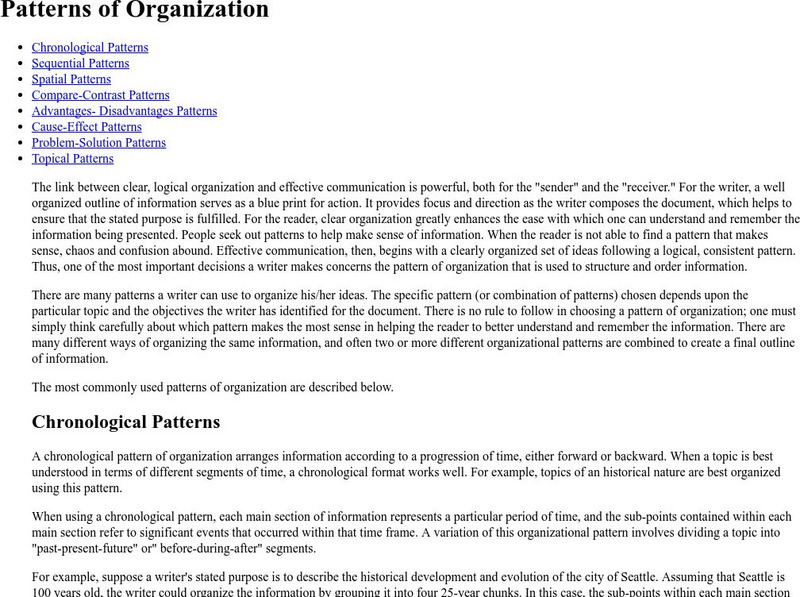Curated OER
Get in Order
Students practice putting events from a written passage in chronological order, both in groups and individually.
Curated OER
Explore Elizabeth I
Students compare pictures of themselves as a baby and a picture of themselves at the present date. In this comparing and contrasting lesson plan, students study the photos and put them in the chronological order.
Curated OER
Down By the Bay
In this "Down by the Bay" worksheet, learners read the poem, respond to 8 short answer question, review 16 sight words, and color and arrange the 14 pictures in chronological order.
Curated OER
RoundRobin
Third graders, following an original start to a new story, verbally add on to the story with sentences that revolve around the major points of information. After the students come up with a story, they draw out the main points in the...
Curated OER
Making Cents of Independence
Students explore the causes and major events of the Texan and American revolutions. Comparisons and contrasts are made between the two revolutionary experiences and applied to the symbolism used on the Texas State quarter.
Curated OER
Time Is of the Essence
Young scholars study the evolution of the Civil Rights Movement from slavery to the present day. They make a timeline using the major events.
University of South Florida
Fcat Express: Teaching Strategies (Reading) [Pdf]
Printable, fifty-five page PDF file of a staff development manual containing strategies for teaching reading. Includes chapters on vocabulary, main ideas and supporting details, author's purpose, chronological order, plot and conflict...
University of California
Ucmp: Sequencing Time
Lesson plan in which learners place events in sequence, comparing their life to the history of the Earth.
Writing Fix
Writing Fix: Between Repeated Catch Phrases
After reading Alexander and the Terrible, Horrible, No Good, Very Bad Day by Judith Viorst, students learn about writing in chronological order and about using a catch phrase throughout a text in order to unite ideas. Teacher...
E Reading Worksheets
E Reading Worksheets: Text Structure Practice 1
This interactive learning exercise provides 10 questions: each includes a reading passage which students read and select the patterns of organization used in each passage. RI.11-12.3 Text development
ReadWriteThink
Read Write Think: Creative Writing Through Wordless Picture Books
Need help planning ways to creatively teach your students chronological order? Here's a great place to start. While the site is specifically geared toward the middle school student, it is a teaching idea which could easily be adapted for...
University of South Florida
Fcat Reading Grade 4: Teaching Strategies
This is a great resource that concentrates strategies and student activities in one place in an easy to use format, and can be navigated easily. Find great examples of probable passage, selective underlining, and semantic feature...
Other
Reading Quest: Strategies for Reading Comp.: History Frames: Story Maps
This activity will help you teach students chronological order as well as identifying key people and events. Printable worksheets.
Daily Teaching Tools
Daily Teaching Tools: Flow Charts for Sequencing
This Daily Teaching Tools resource provides a graphic organizer. Students will be able to write a sequence of events more efficiently by using this tool.
Daily Teaching Tools
Daily Teaching Tools: Time Organizers
This Daily Teaching Tools resource provides a series of five graphic organizers that help with organizing time.
University of South Florida
Fcat Express: Chronological Order
The site provides extensive assistance in preparing 4th-grade students for Florida Comprehensive Assessment Test. This section focuses on identifying the chronological order.
University of South Florida
Fcat Express: Chronological Order
Strategies to help students recognize the order of events in a selection provided by a standardized test preparation site intended for fourth grade. Includes strategies such as plot diagrams, probable passages, story mapping, summary...
Georgia Department of Education
Ga Virtual Learning: Popular Culture: Expository Writing
This lesson focuses on expository writing including definitions, terms, sample expository essays, sequencing events into chonological order, and links to information about how to write expository essays.
Utah Education Network
Uen: Introducing Text Structures in Writing 5th Grade
This instructional activity engages students in learning about text structures. Graphic organizers are provided to assist students in planning writings that have the following text structures: problem and solution; sequence; cause and...
Utah Education Network
Uen: Sequencing a Story
This single-period lesson reinforces the concept of story sequence. Teachers of this lesson will read aloud Enemy Pie, by Derek Munson, How to Make An Apple Pie and See the World by Marjorie Priceman. Then students will participate in...
Utah Education Network
Uen: Second Grade Writing Lesson #2/Narrative Prompt
This lesson engages students in listening to one or more narratives, Then students will engage in the writing process to develop their own personal narrative. Exemplar narratives are provided.
Utah Education Network
Uen: Memories, a Connection to the Past
This lesson engages students in reading comprehension strategies related to Elizabeth Howard's Aunt Flossie's Hats, Mem Fox's Wilford Gordon McDonald Partridge, Bill Martin's Knots On A Counting Rope, and Lucia Gonzales' The Bossy...
University of Washington
University of Washington: Patterns of Organization
In addition to defining and describing various patterns of text organization, this website provides outlines illustrating each pattern. RI.11-12.3 Text development
Teachers.net
Teachers.net: The Gingerbread Man
Introduce your primary students to retelling and sequencing skills. Will also help move your students to higher-level thinking which deals with characters, setting, and plot. Site offers one week's worth of lessons.


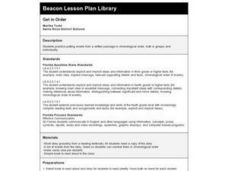


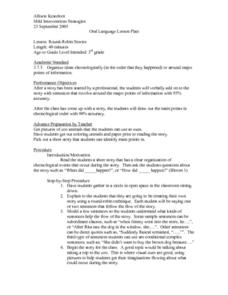


![Fcat Express: Teaching Strategies (Reading) [Pdf] Study Guide Fcat Express: Teaching Strategies (Reading) [Pdf] Study Guide](https://d15y2dacu3jp90.cloudfront.net/images/attachment_defaults/resource/large/FPO-knovation.png)
